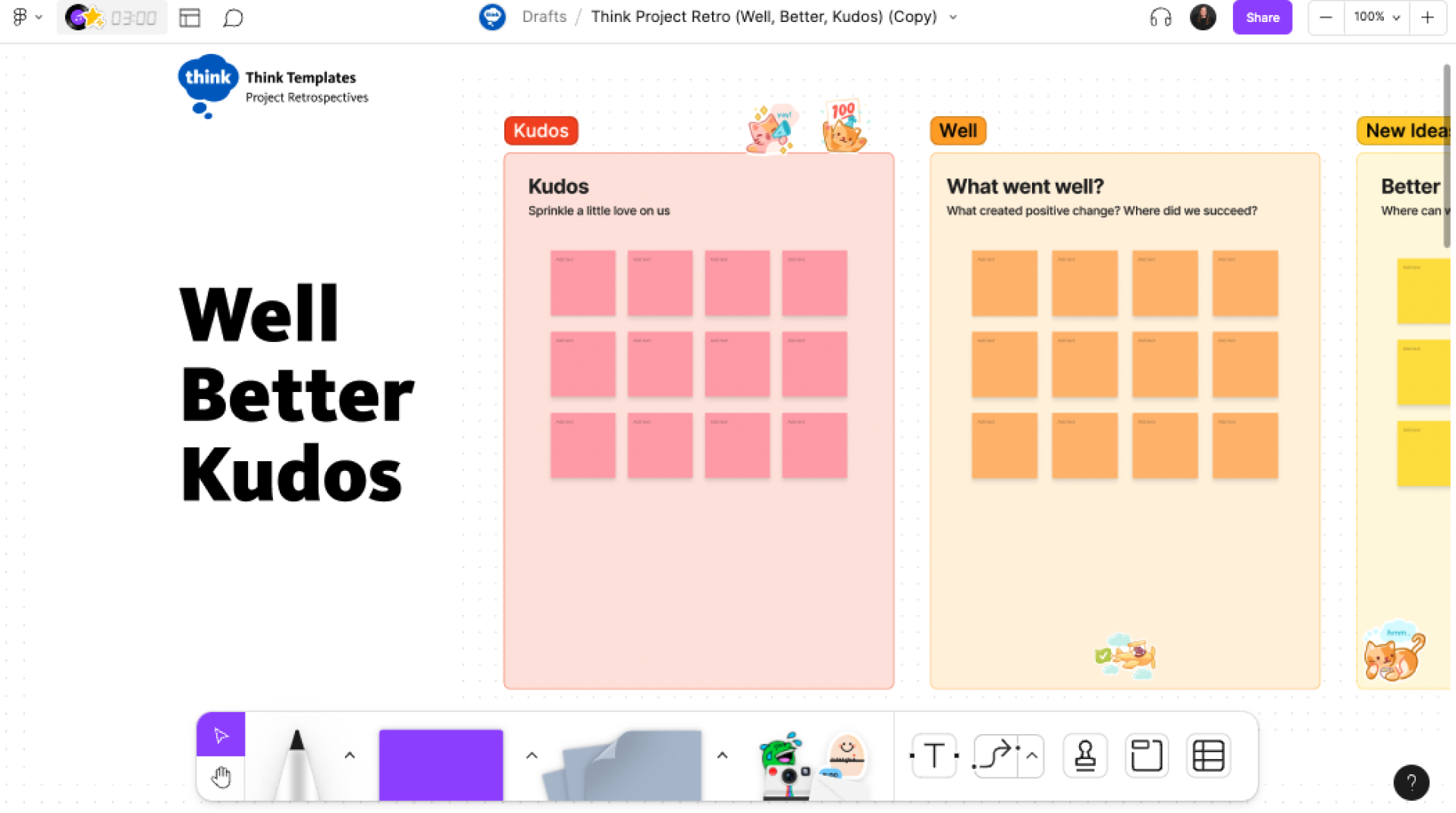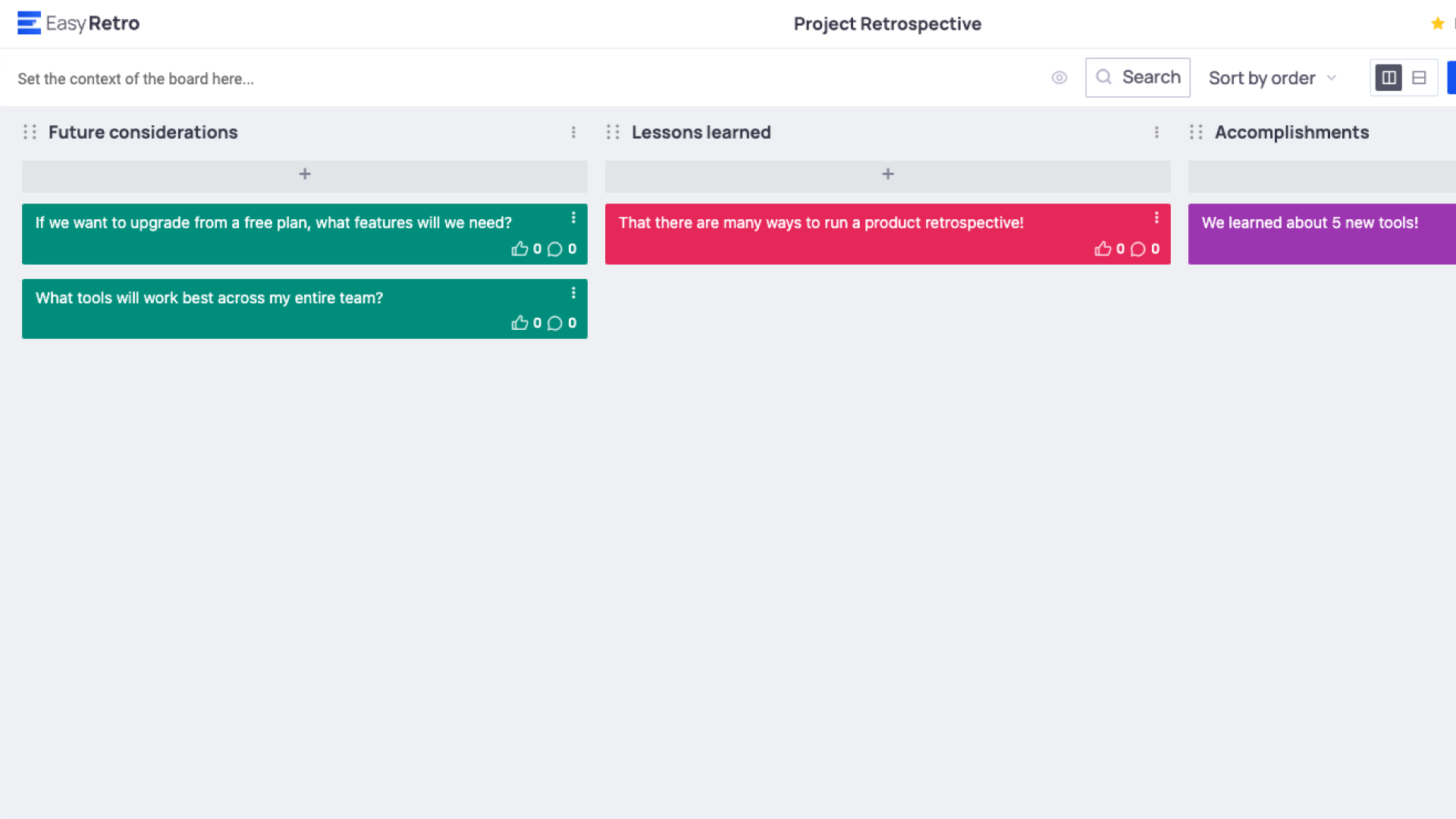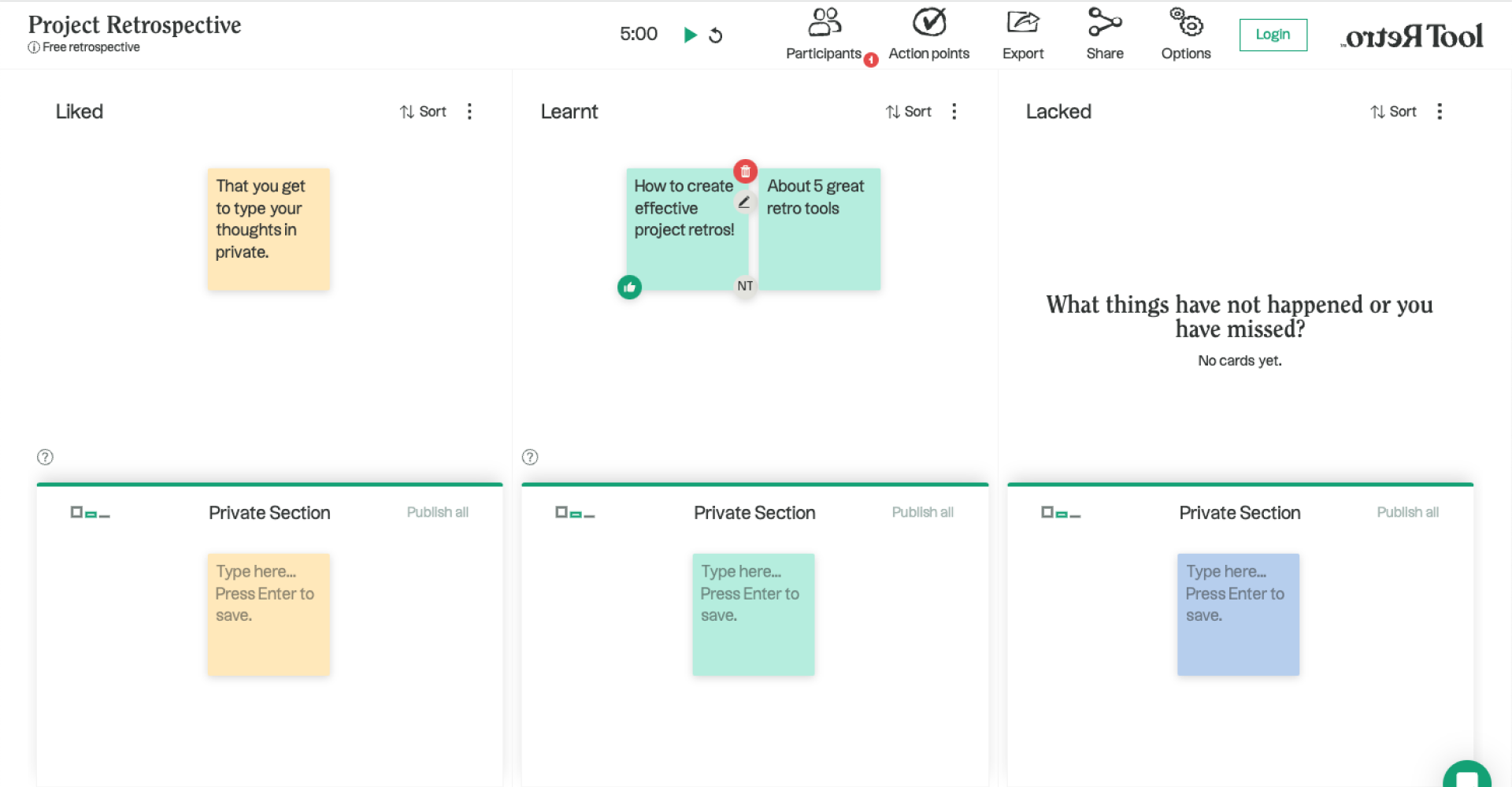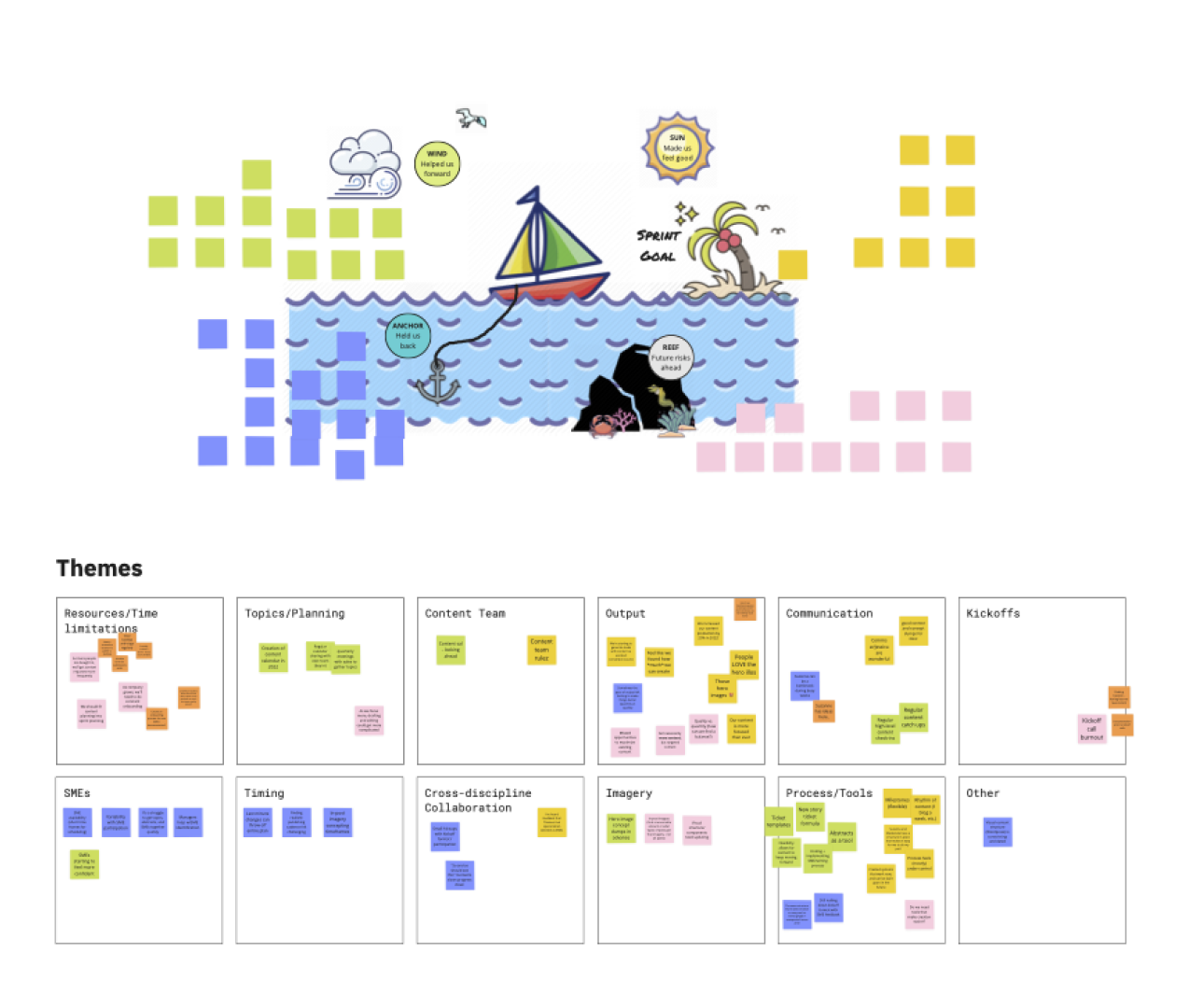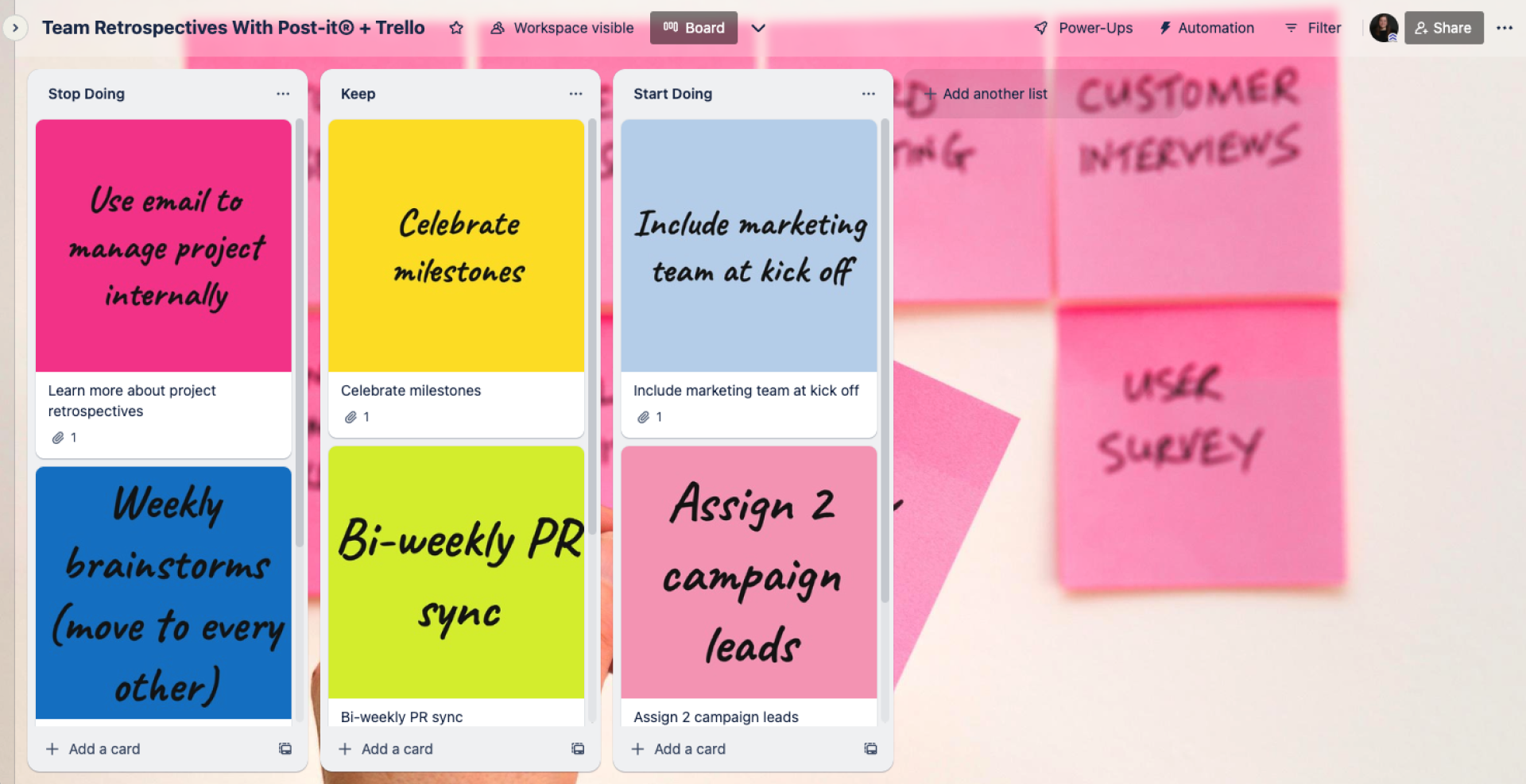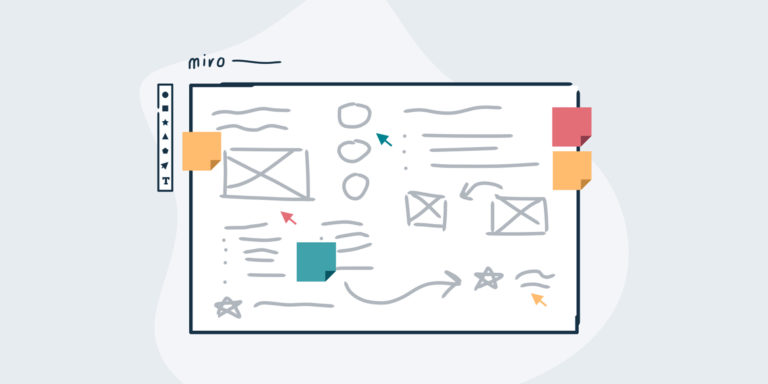5 free project retrospective tools for remote teams

As working from home has become more common, it’s important to find ways to effectively manage remote teams. While many workers have returned to the office in some capacity, the rise of hybrid teams creates new challenges. We’re always looking into tools to help improve collaboration across teams whether they’re in-person, fully remote, or a hybrid operation.
When our PMs went fully remote and were looking for ways to run project retrospectives they found some great tools and some not-so-great tools. There was some stress testing over the past few years as we worked within all three work environments (and still do). We’re sharing 5 project retro tools we discovered along the way.
What is a project retrospective?
A project retrospective is a meeting held at the end of a project, but may also be held after major project milestones are complete. In Agile, a retrospective meeting is held at the end of each sprint. There are different ways to conduct an agile project retrospective, but the main goals are to:
- Reflect on the project
- Identify key successes and failures
- Document lessons that will help us improve future work
At Think Company, one of our core values is to continuously improve. To improve both our clients’ and our own working experience, we take time to reflect on projects and learn from our experiences by conducting project retrospectives.
All project team members are expected to participate and contribute to this meeting.
What is a retrospective tool?
A retrospective tool allows for collaboration during a project retrospective and provides a structured framework for remote teams. Since all team members are expected to participate equally in the meeting in order to have a successful session, it’s important to have a remote retro tool that allows for feedback to be provided independently of others. The facilitator or Scrum Master uses the retrospective tool to plan, manage, and execute the retrospective. An online retrospective tool can also serve as documentation of the meeting, although it should not be the sole documentation (a separate space for more detailed notes may be necessary).
What to look for in a project retrospective tool
When looking for an online retrospective tool, consider the following factors:
- Offers a free version
- Offers project retro frameworks to choose from as a template
- Allows for team collaboration
- Easy to use
Free online retrospective tools
We’ve utilized some of these project retro tools more than others (yes, we have our favorite) but all of the options below are valid resources. They offer features that can be utilized across different work environments; whether your team is fully-remote, hybrid, or in-person they’ll provide you with the canvas you need.
FigJam
FigJam is a go-to tool for retrospectives on our team (we’re avid Figma fans over here). It speaks to our designers hearts and allows us to create customized retro boards and activities. The Figma Community is chock full of templates that you can utilize—we’ve customized multiple to fit our needs.
Some feature highlights of this retrospective tool are:
- Truly customizable; if you can think it you can create it
- Participants can use upvoting and reaction stickers
- Drag and drop features allow easy categorization for further conversations
- Figma community is loaded with pre-made templates
- Voice memo capabilities allow you to record and share audio notes which can be a great way to sum up findings
- Boards can be exported
- Built-in timer
FigJam is free for up to 3 FigJam files (or boards), but offers paid versions with unlimited files and additional features. Our designers, content strategists, developers, and project managers can all work within Figma, cutting out the need for other tools. So, it’s a huge benefit that you can convert Figma files to FigJam. Ultimately meaning, that your entire team could be familiar with this tool when diving into a retrospective.
Overall, FigJam may require a little more manual labor and manipulation, but one of its biggest selling factors is that it’s extremely customizable compared to other tools.
Easy Retro
Easy Retro is a collaborative retrospective tool that is smooth, quick, and easy to use. Whoever is leading the retro will need to create an account in order to start a retro board. However, if you have a Google account, there is an easy single sign-on option.
Once the board is set up, participants do not need to have an account in order to participate. Easy Retro offers retro templates to choose from, but you can also select from other user-created templates.
Some feature highlights of this tool are:
- Cards can be public or anonymous to other participants
- Participants can hide their cards until the group is ready to discuss a particular topic
- Participants can upvote and downvote as well as comment on other participant cards
- Cards have a drag and drop feature enabled in case it’s determined that it’s better suited under another category
- Boards can be exported
- Built-in timer
Easy Retro is free for up to 3 retro boards. If you need to create a new board, you can simply delete an inactive board to continue using the free version.
It takes about 5 minutes to set up a board and determine how to use it. Overall, there are lots of features!
Retro Tool
While Retro Tool may not look as nice as some of the other options or have as many features, it was the most straightforward retrospective tool of the bunch. You don’t need an account, but that also means your work won’t be saved for later reference.
Other highlights of this tool include:
- Pre-made templates
- Participants can hide their cards until the group is ready to discuss a particular topic
- Participants can upvote and downvote other participant cards
- Cards have a drag and drop feature enabled in case they need to be moved around
- Boards can be exported
- Built-in timer
Overall, it gets the job done.
Miro
Miro is frequently used on the Think Company team, and since I already had an account, I wanted to see how Miro stacked up when it came to non-typical use cases.
You will need to have an account in order to use Miro, but there is a single sign-on option if you have a Google account. Participants will also need to have an account, unless you upgrade to a paid plan option.
A couple of the features offered with the free version of this tool are:
- Pre-made templates
- Customizable to fit your team’s needs
- Cards can be moved freely around
- Cards are all anonymous
- Built-in timer
- Boards can be exported
Miro is a free retro tool when using only three active boards at a time, but offers paid versions with unlimited boards and additional features. Miro also offers some fun icebreaker templates to choose from that can be incorporated to the meeting agenda.
Trello
Trello users will need to have an account in order to use the tool, but as with the other account-required tools highlighted above, there is a single sign-on option for users who have a Google account. Participants will also need to have an account. Trello offers one template to choose from.
Limited features of this tool include:
- Cards have a drag and drop feature enabled in case they need to be moved around
- Boards can be exported
Most teams have used it, so they likely already have a login, and there isn’t much of a learning curve, but features are limited.
Enhancing retrospective processes
Teams face a variety of challenges while holding a project retrospective. However, in today’s world, running a project retrospective, whether with in-person or remote team members, does not have to be an added challenge—especially with the number of free and online retrospective tools available at our fingertips. Planning and testing tools ahead of time to determine what works best for you will help to mitigate potential issues the team may encounter and set up your team for success.
Need project management support for your next digital project? Chat with our PMO experts.

